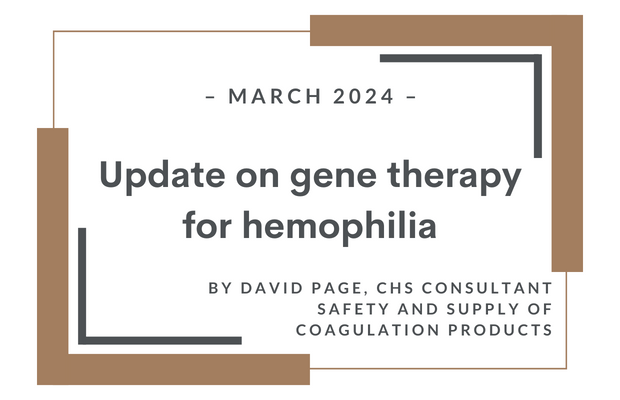Update on hemophilia gene therapy in Canada

Montreal, March 26, 2024 – Developments in gene therapy for hemophilia B have come fast and furious over the last several months.
In October 2023, Health Canada approved CSL Behring’s Hemgenix (etranacogene dezaparvovec) gene therapy for the treatment of hemophilia B. It is indicated for the treatment of adults with hemophilia B who require routine prophylaxis to prevent or reduce the frequency of bleeding episodes. Contraindications include a history of factor IX inhibitors or AAV5 (adeno-associated virus-Type 5) neutralizing antibodies above an established threshold. Hemgenix has also been approved by regulators in Europe and the U.S.
In late December 2023, a second gene therapy for hemophilia B was approved by Canadian regulators, Pfizer’s Beqvez (fidanacogene elaparvovec). Beqvez is indicated for the treatment of adults with moderately severe to severe hemophilia B, generally 2% FIX or less, who are negative for neutralizing antibodies to variant AAV serotype Rh74. A previous history of inhibitors is also a contraindication. The approval of Beqvez by Health Canada represents a world first.
In the last few weeks, the Canadian Agency for Drugs and Technologies in Health (CADTH) has recognized the therapeutic value of both these products, and issued positive reimbursement recommendations to the provinces and territories, conditional on negotiation of reductions in the listed prices of approximately $4.7 million dollars. These negotiations will take place between the two pharmaceutical companies and the public payers, potentially starting soon. Once started, the negotiations typically require six months.
Reimbursement recommendations from Québec’s health technology assessment agency INESSS (Institut national d’excellence en santé et en services sociaux) for both Hemgenix and Beqvez are expected in the coming weeks.
Following these recommendations and the price negotiations, it will be up to each province and territory to decide whether or not to fund these therapies and add them to their drug formularies.
Developments in gene therapy for hemophilia A have been less dramatic. While BioMarin’s Roctavia (valoctocogene roxaparvovec) has been approved in Europe since 2022 and in the U.S. since June 2023 for the treatment of adults with severe hemophilia A with factor VIII activity of less than 1% without pre-existing antibodies to adeno-associated virus serotype 5, uptake has been slow. Only three patients, two in Germany and one in the U.S., have received the therapy outside of clinical trials. Explanations for this include the diminishing levels of FVIII expression seen year-over-year, access to efficacious alternative therapies and the price.
The manufacturer of Roctavian has yet to make a New Drug Submission to Health Canada.
To learn more about the latest results from clinical trials in gene therapy for hemophilia A and B, as well as the many steps to actual patient access, you are invited to register for the Canadian Hemophilia Society (CHS) first webinar on hemophilia gene therapy, A long and winding road, to be held on World Hemophilia Day, April 17.
To register: bit.ly/gene-therapy-webinar1-reg.
Please remember that the CHS has developed a Gene Therapy Education Program, including a comprehensive booklet, podcasts and webcasts. Everything can be found at: www.hemophilia.ca/gene-therapy.




